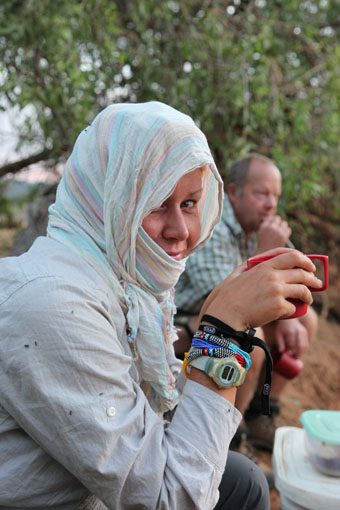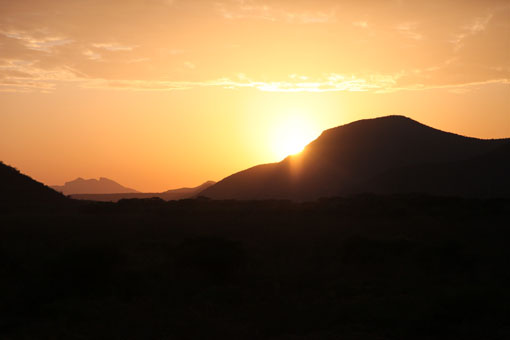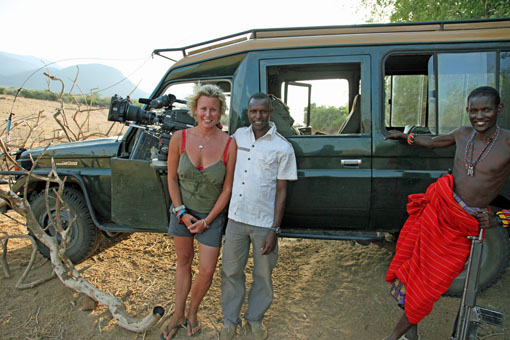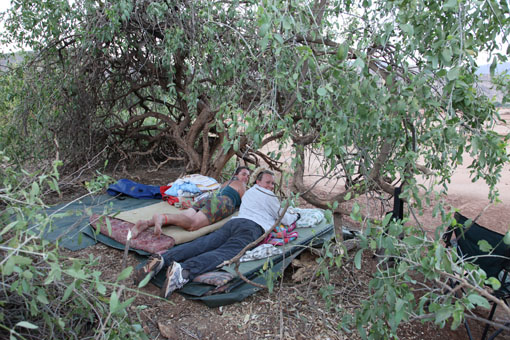Elephants by starlight
by Renee Godfrey, Researcher, Rivers/Urban team
As an anthropologist, most of my television work has been with remote indigenous communities rather than filming with or looking at wildlife. This is where the Human Planet series has stretched my experiences hugely. When I found out about the Samburu story and their relationship with elephants, it seemed a dream come true– the Samburu, one of Kenya’s most traditional and colourful tribal groups; and elephants –one of the world’s most majestic and beautiful animals.
The Human Planet team often find ourselves wide eyed while filming on location, but the Samburu shoot in one of the least accessible parts of an inaccessible region in northern Kenya was an assault on all the senses. We had the usual logistical fun and games of getting a crew and kit to a remote corner of the world and setting up camp but this shoot also presented new challenges. The elephants in the area are at their most active in the riverbed at night time – so, without waving spotlights around like an intimidating laser show, how do we film them in the dark? The answer was an image intensifier camera, a sky brimming with stars, and the light of a full heavy moon. Problem one solved.
The Samburu District covers just over 20,000 square kms. There are no real roads, just miles of raw, unexplored Africa. Transport is by foot, camel or, where sandy soils allow and you can get enough fuel, 4X4. It is Samburu tribal land, no fences, no private game reserves, few if any tourists - man and beast are wonderfully free to roam wherever and whenever they wish.
Thankfully we had the help of the Milgis Trust and their local scouts who sustain and protect the wildlife in the area. Out on foot patrol on the silver sand of the Milgis River bed, the scouts track elephants - reading the landscape for a snapped twig or fresh dung which give clues to when elephants have passed and where they might be headed next. Using these skills, the Milgis scouts are able to map out with amazing precision where we will get our best chances of being in the right spot at the right time to film the elephants.
As soon as the sun sets, hush is enforced. Sitting for eight hours in a hide under the cover of moonlit acacia branches has to be a still and quiet time. Any break in the silence, any sudden movement and the elephants you hope and pray are heading your way, may hear and run, for fear there might be men with guns as opposed to men with camera lenses.
So we sit and wait downwind in our hide, in the black of the night, listening for breaking branches as elephants walk through the bush or the padding of big feet on sand. The riverbed below is an opera stage and we sit above in the Gods, waiting for the performance to begin. The moon aches with light as it casts shadows that play tricks on your eyes. Suddenly and silently, from nowhere, a herd of 18 elephants arrive on stage; babies, mothers, brothers all dance under the moonlight. White faces and whiter teeth smile, and we try to breathe and blink as quietly as we can. Mark Deeble, the cameraman, changes lenses on the camera as if carrying out a Tai Chi routine – every move thought through and with slow, silent grace so as to keep the elephants unaware of our existence.
The elephants move underneath us, babies playing with each other and running around gangly legged and trunked, trying to copy the behaviour of their elegant peers. We are captivated, camera rolling. Trunks touch trunks and tusks gleam brilliantly, irridescent under Nature’s spotlight, until the sound of a distant trumpeting call from deep within the bush breaks the silence and lifts every hair on my body. Another herd are on their way – tonight’s performance is far from coming to an end.
Unexpectedly the evening breeze drops and a light wind blows from our hide down into the riverbed. Within seconds, the herd of elephants below us run off in total silence, back into the acacias. The wind picks up and we realise our human scent will now be drifting up the riverbed and the wise elephants will be heading far away from us. Exhausted but invigorated by what we have just witnessed, it’s time for bed on our mattresses under the blanket of stars. If the wind changes they could come back - this time the elephants would be the ones aware of our existence… while we dream and snore the rest of the night away.
For beautiful pictures of elephants by night, you’ll have to watch the programme!



